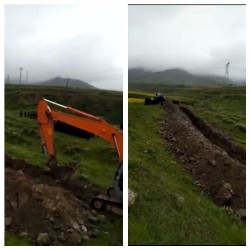
Photo : phayul
A river diversion project is being implemented by Chinese authorities that will affect the availability of water resources for local Tibetan farmers and their livelihood in the Chumar Township in Hui Autonomous County and the Tsohar Prefecture of Qinghai Province, Tibetan province of Amdo. On July 10, a large number of security forces and intelligence officers were deployed by the local authorities to intimidate and restrain the local Tibetans and prevent them from carrying out any form of act to stop the project.
In video footage being shared on social media, bulldozers are shown digging up farmland belonging to the villagers and uniformed security forces can be seen guarding the site with a red banner which reads: “Manage water resources in accordance with law, assist the administration in accordance with law”. Local Tibetans in contact with the Tibetan Centre for Human Rights and Democracy, Tibetan human rights NGO based in Dharamshala, have said that the authorities did not obtain consent to implement the project.
“Official capacity has given rise to speculations among local Tibetans that water is being diverted to benefit the farmlands of the dominant Hui (Chinese Muslim) community that have long held key government and Party positions in the area or to other development projects such as mines or dams,” said TCHRD
The river being diverted is the Chakchu River (also known as Drampa) and this diversion of water resource will affect the predominantly Tibetan farming communities in five villages of the Chukchu area. The villages listed are Traseng, Dro, Gonpo Gyu, Achok and Adhey and the villagers are concerned that they will face water shortages and will not have sufficient water to irrigate their crops or for their livestock. Tibetans in these areas fear possible negative consequences on the overall health of the local environment and their livelihood which is solely dependent on farming and livestock. For the project, even farmland with standing crops is being dug up to make canals and the farmers have not been compensated.




 Print
Print Email
Email